

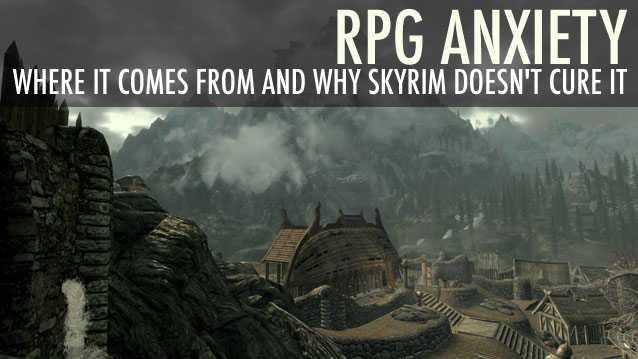
The most important decision you make in most role-playing games occurs before you even play the game. Without knowing how the game even plays, its intricacies or its quirks, you have to pick your character or characters' class. Sometimes it's straightforward, like with the traditional fighter/mage/thief/cleric division from Dungeons & Dragons. But there's often a nagging voice in the back of your head saying “You're doing it wrong.” It's a problem than many RPGs, most currently Skyrim, have tried to solve. However, in attempting to solve the problem, Skyrim might make it worse.
There are two major reasons why this “RPG anxiety” exists – one old, one new, and both need to be understood in order to understand Skyrim's attempt. The old one is that each game has its quirks. The default mode in older role-playing games was for you to create a full party of character, usually four or six of them, who would supplement one another – a fighter guards the weaker characters, a cleric heals, a mage zaps. Though there were often variations on this – maybe the fighter was actually a paladin, maybe the cleric was actually a druid – the roles were theoretically clear-cut. It didn't always work that way.
Take Might & Magic VI (1998), a four-character role-playing game. The game started with six classes, but sorcerers were far and away the strongest, and a party with 3/4s or even all sorcerers was able to blow through the game. But you wouldn't know this on your first playthrough. Although this was more likely to occur in the less-polished games of the past, game quirks and imbalances still exist today. In Dragon Age: Origins (2009), mages again were significantly more powerful than every other class, and if your player character wasn't a mage, going without the magic-users Morrigan or Wynne was a deathwish (or both, on higher difficulty levels).
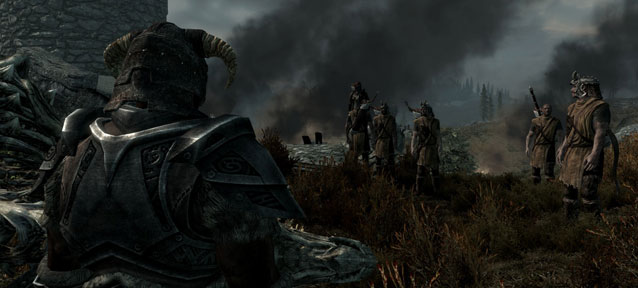
The second cause of “RPG anxiety” springs from the rise of the single-character game, and a blending of the lines between classes. Starting in the mid-1990s, computer (or Western) role-playing games shifted away from a model where you created multiple party members at the start, and instead played a single character, who could sometimes recruit friends. The Elder Scrolls: Arena (1994) was among these pioneers, as were Diablo (1996), Fallout (1997), and Baldur's Gate (1998). But it was Diablo II, released in 2000, that changed the model for good.
Previous games had maintained the model of fighters doing nothing but melee combat, while magic-users get the wide variety of spells. In Diablo, sorcerers had a dozen different spells to choose from, healing, casting lightning bolts and fireballs, and having a different kind of skill to choose from for different situations. Warriors, on the other hand, could hit things. And move. And that's it. At a certain level, the original Diablo, as well as most other RPGs (including the Elder Scrolls predecessors to Skyrim), made magic-users fundamentally more complex than non-magic users. This is not an issue for multi-character games, since the player has access to all the different classes, but it was glaringly obvious in the increasingly popular single-character games.
Diablo II changed this by giving all of its classes equivalently complex skills. Sorceresses and necromancers had their spells, yes, but paladins had auras and barbarians had shouts, amongst other abilities. Complexity was spread evenly. In addition to that, each class had different skillsets which could customize them further, depending on the player's style. An amazon character had the ability to wield bows, thrown javelins, or stab with spears, and each was a plausible build. These additional choices (“specs”, short for “specializations”) became the norm, giving the player the chance to blur or focus their initial class decision. In World Of Warcraft, every class that can be a healer can also deal damage in some form. Or in Dragon Age: Origins a mage can be specced as a shapeshifter in order to be effective in melee combat.
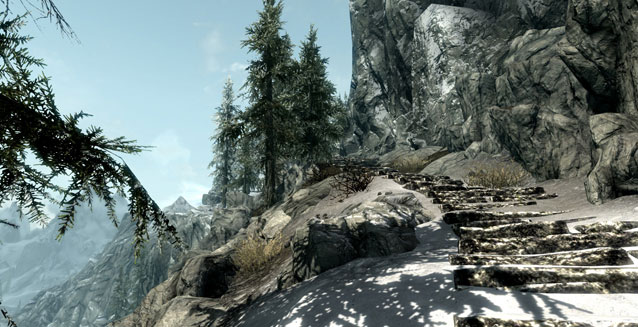
The net effect of these changes has been to make most classes in RPGs roughly equivalent – you have a big choice at the start, and several smaller choices to expand upon your play-style. In a game like Dragon Age, the initial choice might be of a rogue, and if you prefer melee combat, stealth, or archery, there are further choices to go that way. But the main structure remains: your choices and selections in character development lead to the kind of character you should be playing.
Skyrim reverses that idea: your style of play leads to your character development. This is a major shift in how RPGs are conceived, and theoretically, it should relieve RPG anxiety. If you want to be a magic-user, you simply be a magic-user. If you want to be a warrior, you simply be a warrior. When it works, this system works incredibly well. The mechanisms of the game and the playing of the game are harmonious, which is rare for an RPG. But it doesn't always work – and when it doesn't work, the system that theoretically should cause less “RPG anxiety” actually creates more.
Skyrim's biggest initial mistake on that front is that it attempts to maintain a traditional leveling up structure alongside its skill-based system. Your character improves through use of skills, and you level up overall when you've improved enough skills that level. Enemies you face are somewhat attached to your overall level – for example, you'll always see Bandits, but be unlikely to encounter the tougher Bandit Chiefs until the late teens – and there are several “perks” that improve your character that require going up levels. The issue is that if leveling is determined by skills, and difficulty is determined by level, then a “bad” combination of skills will make leveling up an overall negative.
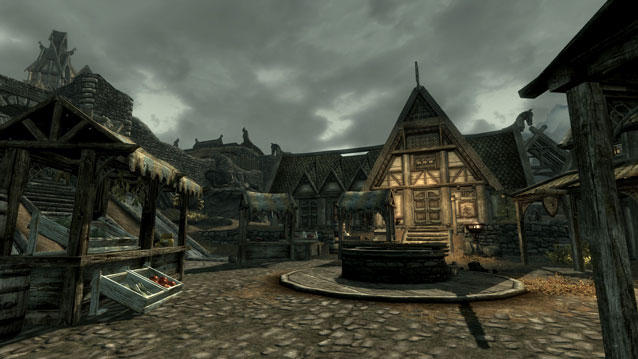
For example, with my first character, I decided to take advantage of Skyrim's very cool two-hand spell/weapon capability, and went into battle with a mace in one hand and an ice spell in the other. Naturally I also needed healing spells. And wore heavy armor, because that's what battlemages do! And if I had heavy armor, I needed to be a blacksmith. And alchemy, because why not? This wasn't a good mix to begin with – melee combat is pretty useless if you can't block, and magic without robes requires planning that my dilettantism couldn't provide. At least, that's how I felt – I had RPG anxiety for most of the game, and by the fifteenth level, I let it overcome me, and started a more conventional warrior character.
What makes Skryim worse than normal is that because it increases levels based on skill practice, you always have the feeling that your problems are as a result of a constant string of mistakes – your mistakes. Worse, you can't always be sure that they're mistakes, because the practice-makes-levels design means that you might think that you have the ability to fix them (you probably don't, without manipulating the game in a rather dull fashion, and perhaps not even then).
Skyrim creates a grey area, then, that serves to increase anxiety. In a binary, yes-or-no system of whether you're playing wrong or not, the answer will quickly become apparent, which makes your next decision easy. By eliminating clear class distinctions, Skyrim seems to move in the right direction for elminating RPG anxiety. But its lack of clarity ends up making the anxiety worse, not better, which becomes one of Skyrim's greatest weaknesses. Skyrim is a crossover hit, the rare role-playing game that's garnering acclaim and sales from all sources – but it's not because Skyrim fixes the problems with the role-playing genre, it's because it transcends them in other ways. It is not the pinnacle of the role-playing game, but it is an important step.
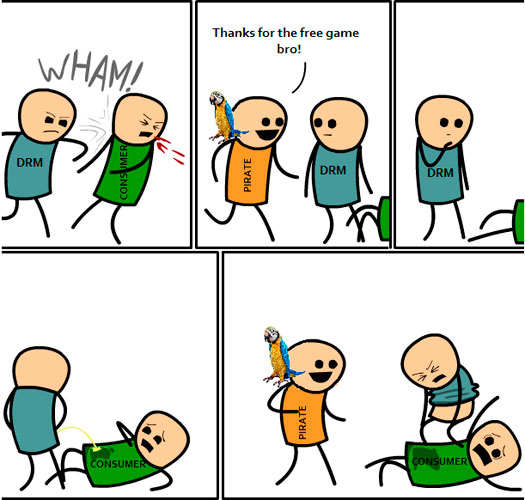
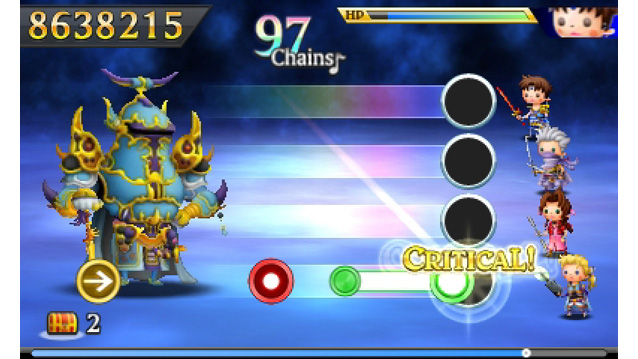
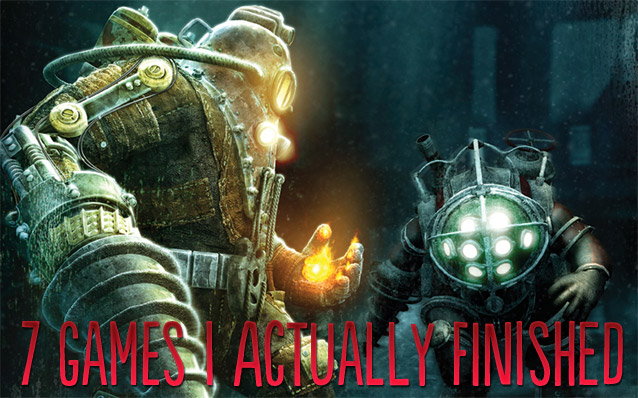

 Pharrell Williams will appear on The Simpsons
Pharrell Williams will appear on The Simpsons This is the First 30 Minutes of Destiny
This is the First 30 Minutes of Destiny All Upcoming Games of 2013 - Multi-platforms vs Exclusives
All Upcoming Games of 2013 - Multi-platforms vs Exclusives Best Minecraft PS Vita Seeds
Best Minecraft PS Vita Seeds Aerial Challenges In Grand Theft Auto V. Under The Bridges
Aerial Challenges In Grand Theft Auto V. Under The Bridges